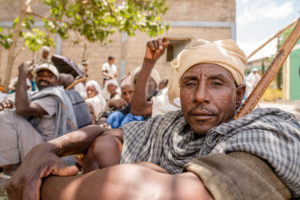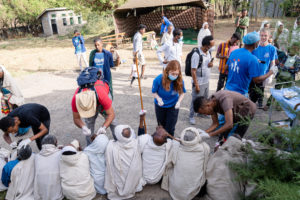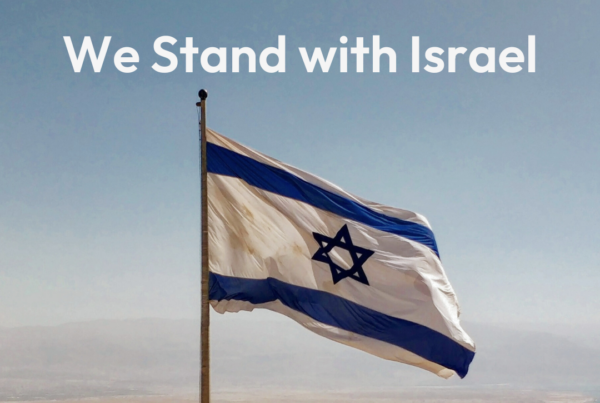 Very soon, Jewish Federation of Greater Atlanta is launching a new quarterly magazine: Generosity. Generosity will highlight stories of philanthropy and community in Jewish Atlanta. Here is an excerpt of the cover story from our inaugural issue:
Very soon, Jewish Federation of Greater Atlanta is launching a new quarterly magazine: Generosity. Generosity will highlight stories of philanthropy and community in Jewish Atlanta. Here is an excerpt of the cover story from our inaugural issue:
This past August, Dr. Morris Hartstein, his wife Elisa Minsk Hartstein, their son Jonah, and six other volunteers were preparing for a trip to Ethiopia—their third in 2022. “Next year we have four medical missions planned,” Morris said.
Morris is an Ophthalmologist who moved to Israel with his family in 2004, and he was prepping for an extremely busy week. Between August 28 and September 2, he and his team (including an eye surgeon and three EMTs) would collectively be operating on 15 patients needing complex oculoplastic surgery, running mobile eye clinics in rural villages, overseeing a cataract campaign funded by their organization where 291 patients would receive sight-restoring cataract surgery, and running first-aid training for local medical staff. Morris and Elisa Hartstein founded Operation Ethiopia to help bring eye care to a population badly in need of medical intervention.
 In 2014, the Hartstein children were between the ages of 11 and 16. They and their parents, wanted to do something meaningful with their summer, rather than take a typical family vacation. They decided to volunteer at the Jewish compound in Gondar, in Ethiopia. About 85% of the Jewish population in Ethiopia lives in Gondar, in conditions that were shocking to the Hartsteins.
In 2014, the Hartstein children were between the ages of 11 and 16. They and their parents, wanted to do something meaningful with their summer, rather than take a typical family vacation. They decided to volunteer at the Jewish compound in Gondar, in Ethiopia. About 85% of the Jewish population in Ethiopia lives in Gondar, in conditions that were shocking to the Hartsteins.
Word got out that Morris was an eye doctor. “Most of the people in the Jewish community in Gondar had never been seen by a doctor before,” he said—let alone an eye doctor.
Morris immediately recognized that many in the village suffered from conditions that could be quickly and easily treated in the United States—like cataracts. Most cases of cataracts are caught and treated early here, before reaching advanced stages. But in Ethiopia, lack of access to medical care, and lack of funds to pay for surgery, means that people eventually become blind. Morris did what he could for the patients he examined that week, but his whole family knew they had to do more.
For the Hartsteins, helping others really is a family affair. Elisa was born a second-generation Jewish Atlantan; she is a graduate of the Hebrew Academy and Yeshiva high school (now known collectively as the Atlanta Jewish Academy). Her parents, Betty and Malcolm Minsk, were stalwart supporters of Federation and other local Jewish organizations. She says that her family’s dedication to helping their community made a major impact on her life, and the work she and Morris do.
The Hartsteins returned home from Gondar and set to work—they purchased medications and eyeglasses using their own money. A year after their first trip to Ethiopia, they returned with 12 suitcases of supplies and set up their first mobile eye triage clinic in the Jewish compound of Gondar.
Over the next few years, the Hartsteins expanded their services beyond the Jewish community to nearby villages. They partnered with Struggle to Save Ethiopian Jewry (SSEJ) to start a feeding program for malnourished children in the Jewish community. They connected with the University of Gondar Hospital and began working with their eye department. Morris started a doctor training program to bring Ethiopian ophthalmologists to his hospital in Israel for advanced specialized training.
Since 2014, Morris has volunteered his time to personally examine and treat nearly 7,000 patients through mobile eye clinics, performed complex oculoplastic surgeries in Gondar and in Addis Abba, and trained Ethiopian eye care professionals. He and his team of volunteers have distributed thousands of units of eye medications and eyeglasses and lead three cataract campaigns. Thanks to these efforts, 1,000 people have regained their eyesight.
Elisa says “the people we treat are the poorest of the poor and have no access to eye doctors or eye care. Even the relatively ‘small’ amount of money that these exams and procedures cost is onerous.” She urges people who want to help to visit operationethiopia.com.




